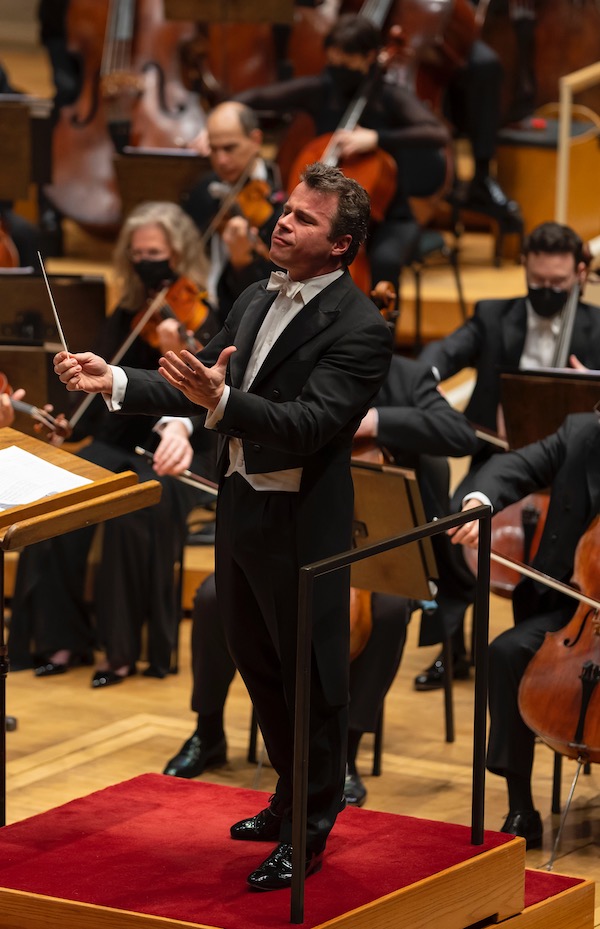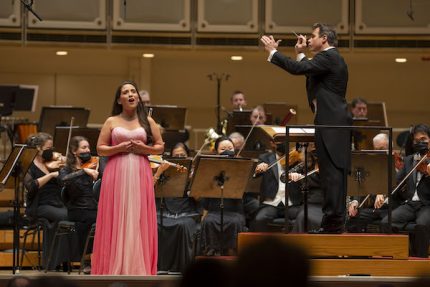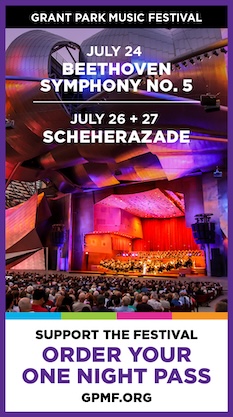In a rousing return, Hrůša ignites with CSO in Dvořák rarity

In 2017 Jakub Hrůša made one of the most successful Chicago Symphony Orchestra debuts of the past decade. In the CSO’s first complete performance of Má vlast in 34 years, the Czech conductor led a vivid, richly idiomatic performance of Smetana’s nationalistic epic.
On Thursday night Hrůša made his much-anticipated return. If anything, the conductor was even more impressive in this sophomore program, bringing not just a blazing performance of a rarity from his country’s most celebrated composer but showing himself an outstanding interpreter of American music to boot.
It would have been easy and predictable to program one of Antonin Dvořák’s popular symphonies. But credit Hrůša for taking the Bohemian path less traveled by bringing us the composer’s Symphony No. 6
From its debut in Prague in 1881, the Sixth Symphony was an enormous success, not only in Dvořák’s homeland, but elsewhere in Europe and abroad. (Theodore Thomas conducted the first CSO performance in 1892.) The Sixth played no small part in establishing the composer’s international reputation. It’s ironic that the symphony that helped bring Dvořák widespread acclaim is so rarely heard today, in comparison to its three successors.
Many commentators have likened the Sixth to the Second Symphony of Brahms, Dvořák’s strong advocate, which was premiered a few years earlier. But apart from also being in D major, the resemblances are few and the Sixth Symphony is Dvořák through and through.
Those individual qualities came through in the boldly projected performance led by Hrůša Thursday night. The Sixth has always seemed limited by less indelible music than the three symphonies that followed. Yet, conducting without a score, Hrůša made such a powerful and compelling case for this music that it’s hard to imagine anyone in the house not being won over.
From the bucolic opening theme and its graceful modulation to the ensuing acceleration and full-bodied emergence, Hrůša paced the long first movement masterfully, the flowing lyricism contrasted in this concentrated performance, with brassy, muscular tuttis, acutely balanced and never blaring.
The conductor was especially good at bringing out the al fresco charm of Dvořák’s rustic wind writing. In the meditative Adagio, Hrůša negotiated the ebb and flow with consummate skill, eliciting atmospheric horn and flute solos; the lurch into the minor at the halfway mark proved aptly jarring in impact.
The tall conductor cuts a vigorous and charismatic figure on the podium–directing with wide circular motions, adding emphasis with quick lunges and graceful leaps. Yet the movements are not show-biz but entirely focused on the music and drawing what he wants to get from the players.
The Scherzo is a punchy Czech Furiant, here insistent and dynamic; in the pastoral trio section, the lovely clarinet, oboe and piccolo playing (Stephen Williamson, William Welter and Jennifer Gunn) could have charmed the Moravian eagles out of the trees.
The lumbering finale isn’t quite as inspired as the preceding movements, but Hrůša deftly disguised the weak points, working the adrenaline level up to the final section with its whirling string fugue en route to a gleaming and triumphant coda.
The extended applause and ovations for Hrůša and the orchestra were well deserved in a rousing performance that provided a highlight of the CSO’s fall season. Let’s please not make it another four years before Jakub Hrůša returns to the CSO podium.
Barber’s Knoxville: Summer of 1915 was the concert’s centerpiece. Set to James Agee’s reminiscence of his Tennessee boyhood, Barber’s music for soprano fully conveys the small-town nostalgia of Agee’s text.
Knoxville is one of those glorious works that almost never come off live in concert. Unfortunately, such was the case again Thursday night, though that was neither the fault of soloist Joélle Harvey nor Hrůša.

The 1997 Orchestra Hall renovation proved disastrous for high frequencies, shearing the luster and shimmer off of violins and damaging the acoustic for high voices. Harvey’s light soprano inevitably sounded remote and failed to project to the back of the lower balcony with words largely indiscernible for those not familiar with the text.
Still, even with that considerable problem, it was clear the singer was delivering a sensitive, intelligent and responsive performance, one that brought out the familial affection and light humor as well as the loneliness and existential dread of the text and Barber’s music.
If the soloist was often off in the murky distance, Hrůša gave a virtual seminar in Barber’s writing for orchestra. In concert or on recording, I have never heard Barber’s score spring to such supple, effervescent life nor with such a myriad of details: rambunctious autos and streetcars, rich string swelling at parents “who are good to me” a dark outburst at “the sorrow of being on this earth” and a golden, suffused coda. Hrůša’s direction here was just as remarkable as in the Dvořák symphony.
The evening began with music of Samuel Coleridge-Taylor, part of a CSO initiative spotlighting works by black composers this season.
CSO founder Theodore Thomas was an open-minded pioneer and led the orchestra in several works by the British composer, including the U.S. premiere of his Ballade in A minor in 1903, which opened Thursday’s concert.
Hrůša led a firmly pointed performance of Coleridge-Taylor’s Ballade. The conductor brought out the rhapsodic essence of the work from the spirited opening theme to the richly spun lyrical second motif, underlining scoring details along the way such as the avian flute twittering.
__________
A plea: Isn’t it time to stop this comical charade where conductors and soloists enter with masks on, remove them to perform, and then put them back on to exit? With most of the orchestra unmasked, it serves no medical or public health benefit at this point for conductors to wear a mask on stage, except to illustrate the inherent absurdities of these contradictory diktats.
The program will be repeated 1:30 p.m. Friday and 8 p.m. Saturday. cso.org
Posted in Performances

Posted Nov 12, 2021 at 5:15 pm by David G Leistensnider
Spot-on review. I saw this concert Thursday night and again Friday afternoon. The Dvorak, which I hadn’t heard before, was even more exciting the second time through. Harvey in Knoxville was louder in Friday’s performance (I sat at the front of lower balcony both times) but I loved her piano singing Thursday night. It came across to me as nuanced and ethereal. Gives me goosebumps to think about that performance.
Posted Nov 12, 2021 at 10:06 pm by Pierre Dosogne
I agree with much of what is said above – however, I have to say that Ms Harvey’s performance was superb from where I was sitting – row N center. I have known this piece for years and have heard many many performances and recordings and I ALWAYS need the text. English is a tough language to sing and to hear and I thought what I heard Thursday was one of the best.
Posted Nov 14, 2021 at 9:40 pm by S. Bradley Gillaugh
I concur with Lawrence Johnson’s review. I sat in the Terrace, never the best seat for balanced acoustics, but mainly to watch Hrusa from the orchestra’s view. A truly charismatic conductor he is.
If only the CSO could get him as often as The Cleveland Orchestra does.
Posted Nov 16, 2021 at 8:18 pm by Marina
Thank you for this review! I bought tickets on a whim after reading it, and the concert was outstanding!
Posted Nov 18, 2021 at 6:45 pm by Plush
Heard this program on FRI afternoon. Mainly went to hear the Barber once more. Such a great piece and Hrusa did so well with it. Harvey is the wrong voice for this work in my opinion and i wanted much more volume and vigor from her à la Dawn Upshaw–a true specialist in this piece. Still, Ms. Harvey’s floated soft notes were effective at setting an atmosphere. However, she could not project with her voice and suffers a demerit.
Hrusa is excellent musically and gave clear and very accurate direction. This charismatic conductor should be considered to succeed Mr. Muti when the time comes.